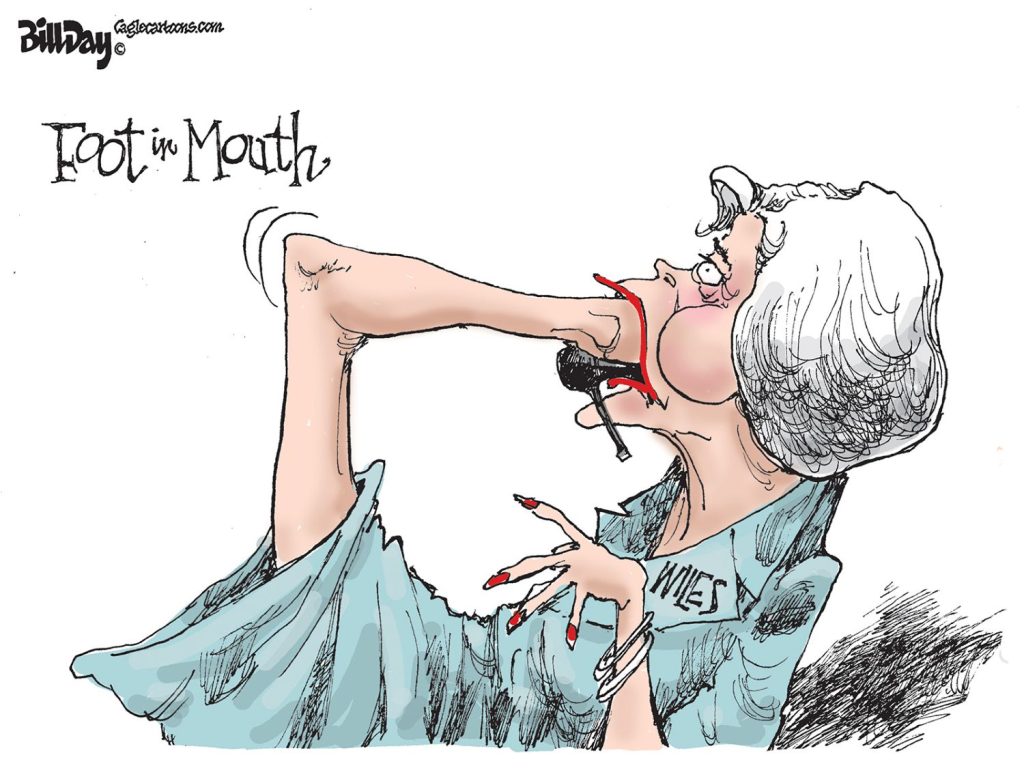The subject of police in city schools is fraught with emotion and opinions.
It’s like arguing about the Bible. There’s something to support whatever side you’re on.
There’s research that indicates that “security resources” within the school district deliver the results needed to make sure students are safe and have an environment conducive to learning. There’s research that suggests that city policemen assigned to schools are effective and bring an air of solemnity to the learning environment.
There is the problem of abuses of students by school security that have been covered up by severa; school districts. There is the long history of abuse problems by commissioned city police.
Cashing Out
In short, it’s possible to argue for the position of either Memphis City Schools Superintendent Kriner Cash or Memphis Police Director Larry Godwin. The superintendent has proposed a police force for the school district, and the police director thinks his department is better equipped to provide school security.
In other words, with research on both sides and anecdotal evidence for both positions, it comes down to who’s in charge and what his approach is.
As for us, we side with Superintendent Cash.
One Note
We are just too concerned over the police director’s one-legged stool approach to crime prevention – suppression. The “lock ‘em up” philosophy fills the jail, but without attention to the other two legs of the stool – intervention and prevention – and represents the most expensive approach to crime-fighting.
We are also concerned about the lowered standards for Memphis policemen, and we hold out hope that Supt. Cash – with a stronger understanding of the benefits of higher education – will set a standard higher than a high school degree for his police force.
On most days, the disagreement seems more driven by personalities than policy and more by turf than theory, but it seems to us that it is the superintendent who is most able in his argument to put children at the center. In addition, the police director has not articulated well enough an approach to balancing the need to keep the schools safe without criminalizing all behavior by students.
Most of us from middle class schools cannot imagine what it’s like. Where we and our kids spent time sitting on the bench in the principal’s office, there is an amplified tendency in urban schools to amplify every breach of rules into a trip to Juvenile Court. It seems to us that with officers from Memphis Police Department in city schools, this would often guarantee “a trip downtown” for too many kids and based on most of our experiences when just getting traffic tickets, we recognize the potential for policemen to overreact to any comments that question their authority or decisions.
It’s About The Kids
Director Godwin often is the epitome of the axiom, “When you’re a hammer, everything looks like a nail.” It’s hard for us to see that being a conducive attitude for providing security in the halls of the schools in our city district.
We’ve had concerns in the past about a school police force, but much of it related to Supt. Cash’s decision to bring the head of security from his old job in Miami to Memphis and to invest so much of his honeymoon period into advocating a police force. But on balance, his passionate determination to turn lives around and to make the district a lever for better options for children’s future convince us that he has the better plan.
We also find it curious that Director Godwin is drawing a line in the sand about a police force in Memphis City Schools since there already are a number of them: Memphis Airport Police, University of Memphis Police, University of Tennessee Police, Memphis Housing Authority Police, Shelby County Government Police, and more. It seems that every one of the concerns that he has put forth in opposing the schools proposal could just as easily apply to every one of these other police forces.
Memphis Mayor A C Wharton – who appoints Director Godwin to his job – has volunteered to mediate the director’s conflict with Superintendent Cash, but there’s little upside for the superintendent to engage in it. His right to approach the Tennessee Legislature for legislation is the same as any other independent agency in Memphis, and from the sound of it, he plans to soldier on with his quest.
Putting Up Barriers
Mayor Wharton’s announced opposition to it “as an idea whose time has not fully arrived” did not offer any hints of what would have to happen for that timely arrival, but we think that Superintendent Cash deserves a chance to prove that he’s right. As a result, we think the Legislature should approve the proposed legislation with a sunset requirement for four years, so that we can quit dealing with opinions and have practical results to measure.
State Rep. G. A. Hardaway said that he’s concerned about officer training and accountability, but we’re not sure MPD measure up so well in those categories either. After all, when the department lowered the standards for policemen, its justification was that it could teach recruits all they needed to know in the police academy. It was laughable to compare the academy to a college criminal justice curriculum, but at any rate, we think Memphis City Schools is capable of creating an effective training program to respond to its unique needs.
After all, it’s not like Memphis City Schools is the first district to have its own police department. There are dozens of them. We recognize that the analysis by city schools seems to be a conclusion in search of a justification, and we are concerned about the potential of creating an atmosphere in city schools similar to Juvenile Court with metal detectors and police officers.
It’s widely recognized by researchers that if we want to cut the rate of criminal activity of youthful offenders, it is by keeping them out of the juvenile justice system for nonviolent crimes. “Once that door slams, the likelihood of them being involved in serious crime skyrockets,” said one. Remember back when an elected official of Memphis was furious because students arrested in Germantown were not automatically sent to Juvenile Court and insisted that “rich kids” should be treated like “poor kids.” She had it backwards – the “poor kids” should be treated like “rich kids” and given a second chance for nonviolence offenses.
That’s another reason that we prefer Superintendent Cash’s proposal for school security. It rests on a solid foundation of intervention and careful handling of school incidents to make sure they do not become a slippery slope that ends at 201 Poplar.






Are you aware that Cash currently uses several bodyguards/mcs policeforce to provide security for him and Dr. Hamer? Even when going to the grocery store?
If he was really interested in creating a security force for MCS surely he would be concerned about the perception his has created by surrounding himself with so many guards.
Additionaly, have you checked out his decision making of late. He is apparently over his head and the board keeps giving him more rope to hang himself.
Guys,
Get out and talk to some real parents with skin in the game, PLEASE!
Since we don’t know whether he’s received threats or not, we can’t make a judgment about his use of security for his travels around Memphis. Would parents really prefer to have policemen in their kids’ schools and with the tendency to treat every problem as a criminal matter?
First off there are already 39 MPD police officers in MCS. They divide their tours of duty between 26 high schools and 19 middle/junior highs. I think Godwin’s issue is less about who enforces the laws in the schools and more about who was covering up instances of criminal activity in the schools. If I am not mistaken Godwin was in favor of this until it came out that there were assaults and other crime related offenses that had NOT been reported to the MPD officers – either at the schools or otherwise. Case in point – the assualt that occurred at White Station that did not come to light until the parents raised hell.
As to this comment: “but we’re not sure MPD measure up so well in those categories either. After all, when the department lowered the standards for policemen, its justification was that it could teach recruits all they needed to know in the police academy. It was laughable to compare the academy to a college criminal justice curriculum…”
You have obviously not spent any time in a 22 week recruit class at the MPD Training Academy. I can guarantee you a police recruit could do circles around a criminal justice student in regards to actual law enforcement.
It doesn’t take much effort to uncover the truth about Cash’s police force in Florida. It is a record of covering up and hushing up crimes that occured in the school district there.
His record of transparancy in Memphis is no better. FOI requests from citizens and the media are usually ignored for months or not answered at all without the filing of a lawsuit or the threat of one.
Cash and his administration routinely tell us only what they think we should know,now what the law says we have a right to know.
In the arena of public accountability, they have almost no credibility. That’s deeply troubling and it’s also sad because Cash is getting some good work done.
No, Superintendent Cash’s proposal for a police force is more about power building and locking the doors than anything else.
Anonymous: If you are suggesting that every incident in city schools should be reported, then again we side with educators who are more concerned about children’s futures than driving up crime enforcement numbers. And we think the news media reports and police department leaks to reporters should be taken with a grain of salt.
Yes. Every incident SHOULD be reported and properly addressed. Whether it be through criminal court, counseling or intervention. You can not intervene or counsel unless you KNOW about the problem. There are TOO many disruptive children in the MCS today who do not allow the “educators” you side with educate the non-disruptive students.
If Godwin is the answer, we sure as hell are asking the wrong question.
Anonymous:
Every incident should be reported and properly addressed, but that doesn’t mean that MPD has to be involved.
You are right, however, the MPD should be notified to determine whether an incident is criminal in nature based on the events that transpired and whether if falls under any criminal statute. That could be a liability issue as well for MCS if they unreport an incident that leads to further incidents where students or faculty are endangered. We don’t live in Mayberry any more.
What if it is a nonviolent misdemeanor? There are so many among us among us who could’ve been charged with some kind of misdemeanor in high school except because we were middle class or went to the right school.
If other cities have school police forces, why is it that ours shouldn’t? And you asked a good question about all the other private police forces and why no one is upset about them? It’s just Godwin being pissed at Cash for not kissing his ring.
Kudos to AC for turning them both down.
This makes me think that AC is keenly aware of the G.R.A.S.S.Y program which is currently being piloted at a few high schools in N. Memphis. Boost the GRASSY program, give it a few years before pushing for another program that, in theory, would be made obsolete if the former program succeeds.
GRASSY is much more inline with AC’s thoughtful and long term vision of proactively dealing with the issues long before they manifest themselves as violent criminal acts.
GRASSY puts the burden back on society for raising our kids rather then leaving it to the penal system.
Well done again Mayor.
What is the GRASSY program?
I looked for it and I found something about Optional school expansion. NO!
If that’s what it is, it’s already outdated and in the WRONG schools.
If the crime is an assault, it is a criminal matter. If it’s a misdemeanor, it’s not. Assault is not a misdemeanor. DRUG dealing is not a misdemeanor, THAT is what’s being covered up!
DON’T blame it all on Dr. CASH. It’s what MCS administration has done since DAY1 to keep from being shut down, it’s called lying by hiding the truth, obstruction of justice for sure.
If the real numbers ever got out, you would be screaming for MCS to shut down and behead that monster over there.